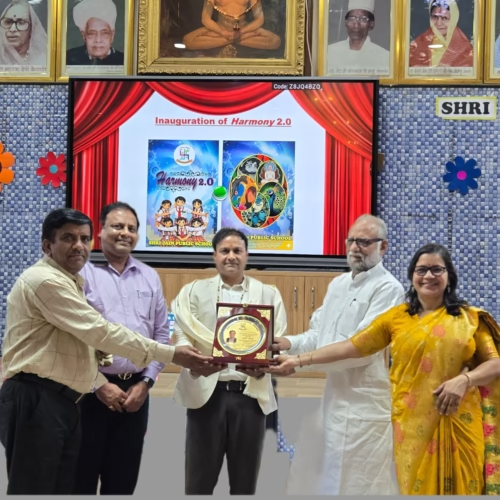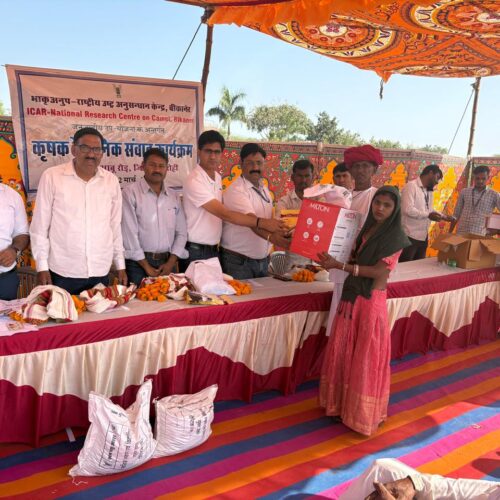राजस्थान में भर्ती परीक्षाओं का नया अध्याय : टैबलेट आधारित परीक्षा प्रणाली की तैयारी
कर्मचारी चयन बोर्ड अध्यक्ष मेजर जनरल आलोक राज ने बीकानेर में ली समीक्षा बैठक, पारदर्शिता और सुरक्षा पर जोर
BY DEFENCE JOURNALIST SAHIL | T.I.N. NETWORK
बीकानेर | सितम्बर 2025
राजस्थान, जो लंबे समय से भर्ती परीक्षाओं में पेपर लीक और नकल माफिया की चुनौती से जूझता रहा है, अब इस व्यवस्था में क्रांतिकारी बदलाव की ओर कदम बढ़ा रहा है। सोमवार को राजस्थान कर्मचारी चयन बोर्ड के अध्यक्ष मेजर जनरल (सेवानिवृत्त) आलोक राज बीकानेर पहुंचे और डीओआईटी (डिपार्टमेंट ऑफ इन्फॉर्मेशन टेक्नोलॉजी) कार्यालय में अधिकारियों की एक महत्वपूर्ण बैठक की। बैठक में आगामी परीक्षाओं की तैयारियों की समीक्षा के साथ-साथ भविष्य की टैबलेट आधारित परीक्षा प्रणाली पर भी विस्तार से चर्चा हुई।
चुनौती का पैमाना
फिलहाल बोर्ड के सामने सबसे बड़ी चुनौती चतुर्थ श्रेणी कर्मचारी भर्ती परीक्षा है, जो 19 से 21 सितम्बर 2025 के बीच आयोजित की जाएगी। इसमें लगभग 25 लाख अभ्यर्थियों के शामिल होने की संभावना है। यह परीक्षा पूरे राज्य के 38 जिलों में होगी, जिसके लिए विशाल प्रशासनिक और सुरक्षा प्रबंध किए जा रहे हैं।
आलोक राज ने स्पष्ट किया कि इस बार बोर्ड की प्राथमिकता सुरक्षा और पारदर्शिता रहेगी। राजस्थान में पिछले वर्षों में बार-बार हुए पेपर लीक कांडों ने न केवल प्रशासन की साख को झटका दिया है, बल्कि लाखों युवाओं की मेहनत और सपनों को भी ध्वस्त किया है। इस अविश्वास की दीवार को तोड़ने के लिए बोर्ड अब सख्त सुरक्षा उपाय लागू करने जा रहा है।
पेपर लीक पर लगाम
बैठक में विस्तार से उन खामियों पर चर्चा हुई, जिनके कारण पहले नकल और पेपर लीक की घटनाएं हुईं। इनमें ओएमआर शीट से छेड़छाड़, डमी उम्मीदवारों के जरिए परीक्षा देना, संगठित नकल गिरोहों का सक्रिय होना और बायोमेट्रिक सिस्टम से छेड़छाड़ जैसी समस्याएं शामिल थीं।
इनसे निपटने के लिए इस बार बोर्ड ने कई कठोर कदम उठाए हैं। सभी परीक्षा केंद्रों पर सीसीटीवी कैमरे और वीडियोग्राफी की व्यवस्था होगी। उम्मीदवारों की पहचान पुख्ता करने के लिए फिंगरप्रिंट और फेस स्कैनिंग लागू की जाएगी। एडमिट कार्ड पर फोटो अनिवार्य होगा, जिससे किसी अन्य व्यक्ति द्वारा परीक्षा देने की संभावना खत्म हो जाएगी।
ड्रेस कोड को लेकर भी आलोक राज ने स्पष्ट किया कि स्पष्ट दिशा-निर्देश जारी किए जा चुके हैं, जिनमें सामान्य परिधान के साथ-साथ धार्मिक और सांस्कृतिक प्रतीकों — जैसे कृपाण, कड़ा, मंगलसूत्र या जनेऊ — को लेकर भी गाइडलाइन शामिल है। उम्मीदवारों से अपील की गई है कि बायोमेट्रिक प्रक्रिया में बाधा न आए, इसके लिए वे हाथों पर मेहंदी न लगाएं।
भविष्य की तैयारी : टैबलेट आधारित परीक्षा प्रणाली
हालांकि निकट भविष्य में सितंबर की परीक्षा प्राथमिकता है, लेकिन दीर्घकालिक योजना के तहत राजस्थान में कंप्यूटर आधारित परीक्षा (CBT) प्रणाली को और आगे बढ़ाया जा रहा है। फिलहाल राज्य के केवल 20,000 निजी कॉलेजों में ही CBT परीक्षा संभव है। लेकिन लाखों अभ्यर्थियों के लिए यह संख्या बेहद कम है।
इसी चुनौती से निपटने के लिए कर्मचारी चयन बोर्ड ने आईआईटी कानपुर और आईआईटी मद्रास के साथ मिलकर टैबलेट आधारित परीक्षा प्रणाली विकसित करने की दिशा में काम शुरू किया है। इस मॉडल के तहत सरकारी विद्यालयों को परीक्षा केंद्र बनाया जाएगा, जहां टैबलेट्स सीधे सर्वर से कनेक्ट होंगे और प्रश्न पत्र परीक्षा शुरू होते ही डिजिटल रूप से उम्मीदवारों तक पहुंचेंगे।
आलोक राज ने बताया कि यह प्रणाली पूरी तरह लीक-प्रूफ होगी। इसे चरणबद्ध तरीके से लागू किया जाएगा — पहले 5,000 अभ्यर्थियों पर परीक्षण होगा, फिर इसे 10,000 और उसके बाद बड़े पैमाने पर लागू किया जाएगा।
फूलप्रूफ सिस्टम की ओर कदम
अध्यक्ष ने भरोसा दिलाया कि बोर्ड का लक्ष्य ऐसा फूलप्रूफ सिस्टम विकसित करना है, जिसमें भविष्य में किसी भी प्रकार के पेपर लीक की गुंजाइश न रहे। यह केवल तकनीकी बदलाव नहीं बल्कि पारदर्शी शासन और युवाओं के विश्वास की बहाली की दिशा में बड़ा कदम है।
पिछले वर्षों में हुए पेपर लीक मामलों के कारण कई बार पूरी परीक्षाएं रद्द करनी पड़ीं, जिससे प्रशासनिक नुकसान तो हुआ ही, लाखों युवाओं का मनोबल भी टूट गया। टैबलेट आधारित यह प्रणाली यदि सफल रहती है, तो यह अभ्यर्थियों के भरोसे को बहाल करेगी और राजस्थान को देश का प्रथम राज्य बनाएगी, जिसने इस पैमाने पर तकनीकी बदलाव लागू किया।
अभ्यर्थी हित सर्वोपरि
आलोक राज ने यह भी स्पष्ट किया कि सुरक्षा उपायों के साथ-साथ बोर्ड अभ्यर्थियों की सुविधाओं के प्रति भी संवेदनशील रहेगा। परीक्षा केंद्रों पर पेयजल, बैठने की उचित व्यवस्था और दिव्यांग अभ्यर्थियों के लिए विशेष सुविधाएं सुनिश्चित करने के निर्देश दिए गए हैं। उन्होंने अभ्यर्थियों से अपील की कि वे बायोमेट्रिक और अन्य प्रक्रियाओं में पूरा सहयोग दें, क्योंकि यह उनके अपने भविष्य की सुरक्षा के लिए जरूरी है।
राष्ट्रीय महत्व
राजस्थान की यह पहल केवल राज्य तक सीमित नहीं है। देश में सबसे अधिक संख्या में अभ्यर्थी भर्ती परीक्षाओं में हिस्सा लेते हैं, ऐसे में राजस्थान का यह प्रयोग दूसरे राज्यों के लिए भी एक मॉडल साबित हो सकता है। यह कदम भारत सरकार की डिजिटल इंडिया पहल के साथ भी पूरी तरह मेल खाता है।
आगे की राह
सितंबर की परीक्षा का सफलतापूर्वक आयोजन बोर्ड के लिए विश्वसनीयता की परीक्षा होगी। लेकिन इससे भी बड़ा लक्ष्य टैबलेट आधारित प्रणाली को लागू करना है, जो आने वाले समय में भर्ती परीक्षाओं को नकल और पेपर लीक से मुक्त कर सकती है।
राजस्थान अब एक नए अध्याय की दहलीज पर है—एक ऐसा अध्याय जहां भर्ती परीक्षाएं पूरी तरह सुरक्षित, पारदर्शी और तकनीक आधारित होंगी, और जहां लाखों युवाओं के सपनों पर अब पेपर लीक का साया नहीं पड़ेगा।
A New Era in Recruitment Examinations: Rajasthan Prepares for Tablet-Based Examination System
Chairman of Staff Selection Board Major General Alok Raj Reviews Preparations in Bikaner, Outlines Roadmap for Secure and Transparent Exams
BY DEFENCE JOURNALIST SAHIL | T.I.N. NETWORK
Bikaner | September 2025
The state of Rajasthan, long grappling with the recurring menace of paper leaks and malpractice in recruitment examinations, is preparing to embark on a new chapter in its examination history. On Monday, Rajasthan Staff Selection Board Chairman Major General (Retd) Alok Raj arrived in Bikaner and chaired a crucial review meeting at the DOIT (Department of Information Technology) office. The meeting, attended by senior officials, district representatives, and technical experts, focused on preparations for upcoming large-scale recruitment examinations as well as the long-term transition to a fully secure, technology-driven system.
The Scale of the Challenge
The immediate concern before the Board is the Class IV employee recruitment examination, scheduled to be held between 19 and 21 September 2025. With nearly 25 lakh candidates expected to appear, the magnitude of the task is staggering. The examinations will be conducted across 38 districts of Rajasthan, involving elaborate logistical arrangements, security layers, and administrative preparedness.
Alok Raj emphasized that security and transparency will remain the top priorities of the Board. The recent history of paper leaks in Rajasthan has undermined public confidence in government recruitments, sparking protests, court interventions, and political upheavals. Determined to end this cycle, the Board is introducing a multi-pronged security framework to eliminate loopholes that have traditionally been exploited by cheating syndicates.
Tackling the Paper Leak Menace
The review meeting discussed, in detail, the vulnerabilities that plagued earlier examination processes. Issues such as OMR (Optical Mark Recognition) tampering, impersonation by dummy candidates, organized cheating networks, and biometric manipulation were scrutinized.
To counter these, the Board has laid out a stringent security protocol. CCTV cameras, videography, biometric fingerprinting, and facial recognition scans will be deployed at examination centers. Candidates will be required to carry admit cards with photographs, making impersonation nearly impossible.
Dress codes, often a point of contention, were also addressed. Alok Raj clarified that clear guidelines have already been issued, covering not only standard examination attire but also religious and cultural symbols such as kirpans, kada, mangalsutra, or janeyu. Candidates have been advised to cooperate fully with the biometric process and avoid applying substances like mehendi on their hands, which could interfere with fingerprint recognition.
The Future: From CBT to Tablet-Based System
While the immediate focus is on the September examination, the larger reform lies in the adoption of technology-based solutions. Presently, computer-based tests (CBTs) are conducted in only about 20,000 private colleges in the state. However, given the sheer number of candidates—often running into lakhs—the infrastructure remains inadequate.
To bridge this gap, the Board, under the leadership of Alok Raj, has initiated collaboration with IIT Kanpur and IIT Madras to design and implement a tablet-based examination system. This innovative approach envisions using government schools as examination centers, each equipped with tablets directly linked to a central server.
According to Alok Raj, this model will be leak-proof, as question papers will be securely uploaded to the server and delivered digitally to candidates’ tablets at the time of examination. The system will be phased in gradually: first for 5,000 candidates, then 10,000, and eventually scaled up for mass-level state-wide recruitments.
Building a Foolproof Examination Ecosystem
The Chairman reiterated that the Board’s mission is to develop a foolproof examination ecosystem that eliminates the possibility of malpractice altogether. The move to tablet-based testing is not just a technical shift but a paradigm change in governance and trust-building.
Examinations in Rajasthan have historically been marred by scandals, some of which led to the cancellation of entire recruitment cycles. Such incidents caused not only administrative losses but also shattered the morale of lakhs of aspirants who prepared for years. The new system, if successful, promises to restore faith in the recruitment process and establish Rajasthan as a pioneer in secure, technology-driven mass examinations.
Candidate-Centric Measures
Alok Raj also stressed that while security is a priority, sensitivity towards candidates’ concerns will guide decision-making. Instructions have been issued to ensure that no aspirant faces unnecessary hardship. Exam centers will be monitored not only for malpractice but also for basic amenities like drinking water, seating arrangements, and accessibility for differently-abled candidates.
He appealed to aspirants to cooperate with the biometric and security procedures, emphasizing that these safeguards are designed to protect their own future and prevent exploitation by organized cheating mafias.
Rajasthan’s National Significance
The developments in Rajasthan carry wider implications for the country. With some of the largest examination candidate pools in India, Rajasthan often sets precedents for administrative practices in recruitment. A successful shift to tablet-based secure examinations could provide a model for other states struggling with similar challenges.
At a time when India is pushing towards digital governance, the Rajasthan experiment could align seamlessly with the broader vision of Digital India, ensuring that public sector recruitment is conducted with transparency, fairness, and technological innovation.
Looking Ahead
As the countdown begins for the September examination, the eyes of both candidates and the political establishment are on the Rajasthan Staff Selection Board. For aspirants, this represents a test of patience and trust; for the administration, it is a test of credibility.
If the Board successfully conducts the Class IV recruitment examination without lapses, it will mark a significant step forward. But more importantly, the transition to the tablet-based system will determine whether Rajasthan can indeed write a new chapter—one where the specter of paper leaks and organized malpractice becomes a thing of the past.












Add Comment